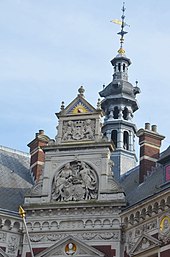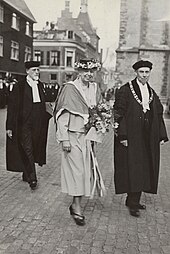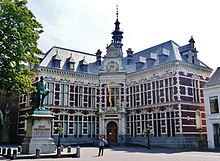|
Utrecht University
Utrecht University (UU; Dutch: Universiteit Utrecht, formerly Rijksuniversiteit Utrecht) is a public research university in Utrecht, Netherlands. Established 26 March 1636, it is one of the oldest universities in the Netherlands. In 2023, it had an enrollment of 39,769 students, and employed 8,929 faculty members and staff.[4] More than 400 PhD degrees were awarded and 7,765 scientific articles were published. The university's 2023 budget was €2.8 billion, consisting of €1.157 billion for the university[4] (income from work commissioned by third parties is 319 million euros) and €1.643 billion for the University Medical Centre Utrecht.[6] The university's interdisciplinary research targets life sciences, pathways to sustainability, dynamics of youth, and institutions for open societies. Its teaching and research are strongly connected where equality, diversity, and inclusion are valued. Utrecht University counts a number of distinguished scholars among its alumni and faculty, including 12 Nobel Prize, 1 Pulitzer Prize, 2 Wolf Prize, 2 National Medal of Science, 21 Spinoza Prize and 3 Stevin Prize laureates. The university counts several heads of state and government amongst its graduates, including: 4 members of Dutch royal house, 6 Prime Ministers of the Netherlands, An American Founding Father and signatory to the United States Constitution Hugh Williamson, 1 Prime Minister of United Kingdom of Great Britain and Ireland: William Pitt, 1st Earl of Chatham, an ancestor of both Winston Churchill and Diana, Princess of Wales, First Lord of the Treasury: Charles Spencer, 3rd Earl of Sunderland, 4 foreign heads of state or government, and 35 Ministers of the Cabinet of the Netherlands. An English economist Nicholas Barbon who was one of the first proponents of the free market studied at Utrecht University.[7] German Margrave of Baden-Durlach, Charles III William, Margrave of Baden-Durlach who established the city Karlsruhe studied at Utrecht University.[7] René Descartes, a French philosopher, scientist, and mathematician who developed the techniques of analytical geometry, was taught physics by Henricus Regius, a professor of medicine at Utrecht University.[8] Utrecht University alumni have won a total of 13 gold Olympic medals.[9] Utrecht University is led by the University Board, consisting of Henk Kummeling (Rector Magnificus), Anton Pijpers (chair), Margot van der Starre (Vice Chair) and Niels Vreeswijk (Student Assessor).Close ties are harboured with other institutions internationally through its membership in the Coimbra Group (CG), the League of European Research Universities (LERU), the Utrecht Network and the European University Association (EUA). History  Utrecht University was founded on 26 March 1636.[10] It has its roots in the Illustrious School of Utrecht, which founded two years earlier in 1634 before being elevated to the status of university in 1636. The influential professor of theology Gisbertus Voetius delivered the inaugural speech, and Bernardus Schotanus (professor of law and mathematics) became the university's first rector magnificus. Anna Maria van Schurman, who became the university's first female student, was invited to write a Latin poem for the inauguration.[11] Initially, only a few dozen students attended classes at the university. Seven professors worked in four faculties: philosophy, which offered all students an introductory education, and three higher-level faculties (theology, medicine and law). Utrecht University flourished in the seventeenth century, and contributed significantly to the Dutch Golden Age, despite competition with the older universities, such as Leiden (1575) and Groningen (1614). Leiden, in particular, proved a strong competitor and made further improvement necessary; a rivalry that persists to this day. A botanical garden was built on the grounds of the present Sonnenborgh Observatory, and three years later the Smeetoren added an astronomical observatory. The university attracted many students from abroad (especially from Germany, England and Scotland). They witnessed the intellectual and theological battle fought between proponents of the new philosophy (René Descartes lived for a few years in Utrecht) and proponents of the strict Reformed theologian Voetius. They also witnessed the teachings of renowned Dutch jurist, Johannes Voet, a university alumnus and professor of law, whose works remain highly authoritative in modern Roman-Dutch law.  In 1806, the French occupying authorities of the Netherlands downgraded Utrecht University to an école secondaire (high school), but after the establishment of the United Kingdom of the Netherlands in 1813 it regained its former status.[10] Leiden, Leuven, Groningen, Utrecht and Ghent were the five universities (Dutch: hoge scholen) of the new state. Two of the universities (Leuven and Ghent) became part of the new Belgian state after their respective provinces separated from the United Kingdom of the Netherlands in 1830. As a result, Utrecht University remained one of only three Dutch universities. During the French occupation, King Louis Napoleon ordered the construction of a palace in the centre of Utrecht, which eventually became the University Library City Centre.[10] Utrecht University played a prominent role in the golden age of Dutch science. Around 1850 the "Utrechtian School" of science formed, with Pieter Harting, Gerardus J. Mulder, Christophorus H. D. Buys Ballot and Franciscus Donders among the leading scientists. They introduced the educational laboratory (onderwijslaboratorium) as a practical learning place for their students. The National Veterinary School (Dutch:Rijks Veeartsenijschool) became Utrecht University's Faculty of Veterinary Medicine in 1918. As the university grew, the academic buildings in the historic city centre were unable to meet the university's increasing need for space. Therefore, starting from the 1960s, a significant part of the university moved to the De Uithof campus, which occupies the easternmost part of the city and is located south of De Bilt. However, the university continued to retain its academic buildings and presence in the historic city centre. The university is represented in the Stichting Academisch Erfgoed, a foundation with the goal of preserving the university's heritage and collections. Organisation The university consists of seven faculties, which offer 58 undergraduate degree programmes and over 150 graduate programmes.[12]
There are also three interfaculty units:
CampusThe two large faculties of Humanities and Law & Governance are situated in the inner city of Utrecht. The other five faculties and most of the administrative services are located in Utrecht Science Park De Uithof, a campus area on the outskirts of the city. University College Utrecht, along with the Utrecht School of Economics, are situated in the former Kromhout Kazerne, which used to be a Dutch military base. University College Roosevelt is located off-campus in the city of Middelburg in the south-west of the Netherlands.
International rankings
On the 2024 AWRU list, the University of Utrecht was ranked 55th globally and the highest in the Netherlands. Its ranking has declined slightly since 2003, when it was ranked 40th. Best-ranked subjects in the world by AWRU 2024:
In the 2024 USNWR, Utrecht University is ranked 46th best University in the world. Best-ranked subjects in the world by USNWR 2024:
In the 2023 THE ranking, the university is ranked 66th.[20] Best-ranked subjects in the world by THE ranking 2023:
QS ranking by Subject 2024
Utrecht University was also mentioned in the BlueSky Ranking Of University Rankings 2022/23 published by Matt Symonds, who is the S of QS, co-founding QS Quacquarelli Symonds ranking. BlueSky Ranking Of University Rankings considers the aggregation of the performance of schools across four major rankings: AWRU, QS,THE, and USNWR. In this ranking, Utrecht University was placed 60th in the world, 18th in Europe, and 1st in the Netherlands.[24] AffiliationsUtrecht University is a member of the Coimbra Group (CG), League of European Research Universities (LERU), the Utrecht Network, the European University Association (EUA), the International Association of Universities (IAU) and the McDonnell International Scholars Academy (MISA). Notable alumni and facultySee also
References
External linksWikimedia Commons has media related to Universiteit Utrecht.
|
||||||||||||||||||||||||||||||||||||||||||||||||||||||||||||||||||||||||||||







